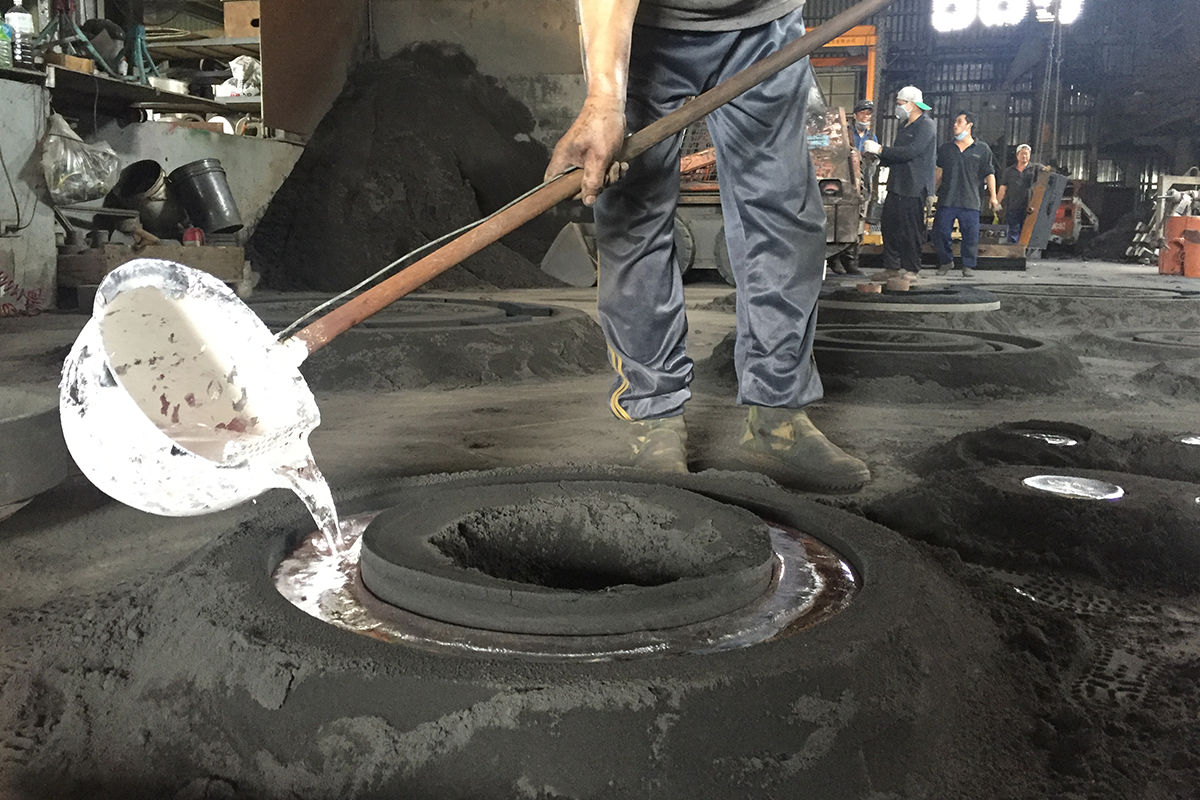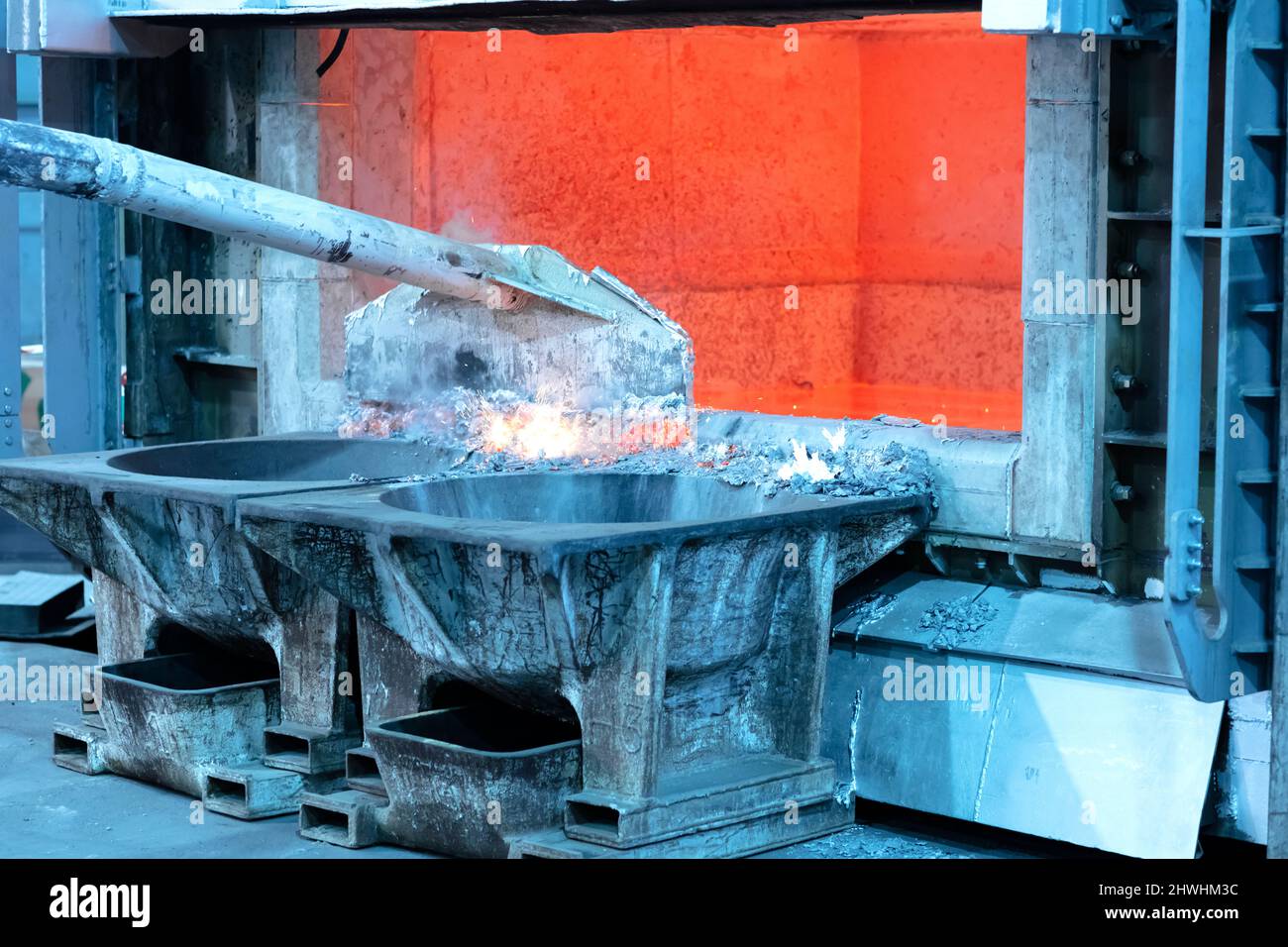Comprehending the Conveniences and Innovations in the Aluminum Foundry Industry
The Aluminum Foundry sector plays an essential function in modern production. Its light-weight properties especially boost gas performance, especially in aerospace and auto fields. In addition, Aluminum's resistance to rust guarantees longevity in different applications. As the sector develops, developments such as sophisticated recycling and additive production are improving production approaches. Discovering these developments discloses not just the advantages but additionally the obstacles ahead for Aluminum factories in a swiftly altering market.
The Lightweight Advantage of Aluminum
Aluminum's lightweight nature uses significant advantages across various markets, specifically in production and transportation. Its low thickness enables the production of elements that are less complicated to mount and take care of, resulting in reduced labor costs and improved effectiveness. In the automobile industry, lighter cars contribute to boosted gas economy and lower emissions, lining up with international sustainability objectives. In aerospace, the use of Aluminum reduces the general weight of airplane, which is crucial for improving performance and reducing operational costs.
In addition, Aluminum's light-weight buildings help with cutting-edge designs that were formerly impossible with heavier materials. This flexibility enables suppliers to produce intricate shapes and structures while preserving structural honesty. On the whole, the light-weight advantage of Aluminum not just improves item performance yet also drives developments in innovation and design, making it a favored material in different applications.
Corrosion Resistance and Sturdiness
The Aluminum Foundry industry is renowned for creating products with superior deterioration resistance, making them excellent for numerous applications. This residential or commercial property, combined with enhanced architectural honesty, contributes to the long-lasting performance advantages that Aluminum parts use. As an outcome, markets increasingly rely upon Aluminum to meet requiring environmental problems without jeopardizing quality.
Superior Corrosion Resistance
While various metals deal with significant obstacles from ecological factors, Aluminum attracts attention for its premium rust resistance, making it a recommended option in many applications. This home is mostly because of a natural oxide layer that bases on the Aluminum surface area, offering an obstacle against moisture and corrosive representatives. Unlike other metals that may corrosion or deteriorate gradually, Aluminum maintains its stability also in extreme atmospheres, such as industrial settings or seaside locations. In addition, its lightweight nature integrated with corrosion resistance makes it excellent for applications in aerospace, vehicle, and marine industries. In general, Aluminum's outstanding longevity not only enhances product long life but additionally lowers maintenance costs, presenting an engaging advantage for consumers and manufacturers alike.
Improved Structural Honesty
Developers and designers increasingly identify the importance of improved architectural honesty in modern applications, where both corrosion resistance and durability are vital. Aluminum alloys, recognized for their light-weight homes, additionally display phenomenal resistance to rust, making them ideal for severe environments. The ingenious methods employed in the Aluminum Foundry sector contribute substantially to creating parts with improved durability. Advanced casting processes and alloy compositions are customized to satisfy specific performance needs, making certain that structures can hold up against extreme problems without endangering integrity. Additionally, surface area treatments and finishings enhance the life expectancy of Aluminum products, additionally alleviating deterioration over time. This focus on improved structural integrity not only extends the use of materials however also lowers upkeep prices, solidifying Aluminum's position as a material of choice in different markets.
Long-lasting Efficiency Advantages
Durable efficiency in Aluminum components is mainly credited to their remarkable deterioration resistance and sturdiness. Unlike lots of metals, Aluminum normally forms a protective oxide layer, which stops corrosion and wear and tear in numerous atmospheres, including marine and industrial settings. This intrinsic residential or commercial property significantly expands the life-span of Aluminum products, reducing upkeep and substitute prices. In addition, the light-weight nature of Aluminum improves its applicability across markets without jeopardizing toughness. The product's resistance to damage also adds to its reliability in requiring applications, making it a perfect selection for auto, aerospace, and construction markets. As markets increasingly focus on sustainability and long life, Aluminum's efficiency advantages line up with contemporary engineering demands, solidifying its role in ingenious production procedures.
Ecological Effect and Sustainability
 As the Aluminum Foundry sector develops, it progressively focuses on environmental influence and sustainability, identifying the need for liable practices in the face of climate change. Efforts to decrease waste and power consumption are at the center, with numerous foundries taking on reusing campaigns to redeem Aluminum scrap. This not only decreases basic material use but likewise especially cuts down energy expenditure, as recycled Aluminum needs only a portion of the energy contrasted to primary manufacturing.
As the Aluminum Foundry sector develops, it progressively focuses on environmental influence and sustainability, identifying the need for liable practices in the face of climate change. Efforts to decrease waste and power consumption are at the center, with numerous foundries taking on reusing campaigns to redeem Aluminum scrap. This not only decreases basic material use but likewise especially cuts down energy expenditure, as recycled Aluminum needs only a portion of the energy contrasted to primary manufacturing.Developments in discharges control modern technologies are being executed to reduce air toxins, straightening procedures with more stringent environmental laws. Shops are likewise discovering alternate energy resources, such as solar and wind, to power their centers sustainably. By promoting partnership with stakeholders, the market intends to create cutting-edge remedies that enhance eco-friendly stewardship. Jointly, these campaigns highlight a commitment to lowering the Aluminum Foundry's carbon impact while promoting a circular economy within the production market.
Advanced Manufacturing Techniques
 Revolutionizing manufacturing procedures, the Aluminum Foundry industry is progressively integrating advanced production strategies to improve performance and accuracy. Techniques such as computer numerical control (CNC) machining and additive manufacturing have actually become vital components in optimizing manufacturing operations. CNC machining enables for high-precision part manufacture, greatly reducing product waste and production time. Additive manufacturing opens brand-new methods for complicated geometries and light-weight styles that were formerly hard to achieve.
Revolutionizing manufacturing procedures, the Aluminum Foundry industry is progressively integrating advanced production strategies to improve performance and accuracy. Techniques such as computer numerical control (CNC) machining and additive manufacturing have actually become vital components in optimizing manufacturing operations. CNC machining enables for high-precision part manufacture, greatly reducing product waste and production time. Additive manufacturing opens brand-new methods for complicated geometries and light-weight styles that were formerly hard to achieve.In addition, the deployment of automation and robotics in Aluminum shops enhances procedures, decreases human mistake, and improves worker security. These innovations facilitate an even more receptive production environment, allowing producers to adapt rapidly to market demands. The assimilation of innovative simulation software program additionally boosts the style and screening phases, leading to exceptional item top quality. Jointly, these strategies not only boost operational efficiency yet likewise foster technology, positioning the Aluminum Foundry industry at the leading edge of contemporary production.
Developments in Recycling Procedures
The Aluminum Foundry industry is not just progressing in producing methods yet is likewise making considerable strides in recycling processes. Innovations are arising to enhance the efficiency of reusing techniques, lowering energy usage and improving sustainability. Advanced arranging innovations, such as automatic optical sorting, enable the identification and splitting up of Aluminum from various other products with high precision. This results in a better of recycled Aluminum, which is vital for maintaining the stability of the last products.
Closed-loop recycling systems redirected here are being carried out, allowing makers to recycle Aluminum scrap within their very own production procedures. This decreases waste and advertises a round economic climate. Furthermore, research into new recycling techniques, such as hydrometallurgical procedures, provides the capacity for recouping Aluminum from complex waste streams. These innovations not only add to minimizing the carbon footprint of the Aluminum Foundry sector yet additionally bolster its economic viability in an increasingly eco aware market.
Applications Throughout Numerous Industries
Countless sectors are increasingly identifying the convenience and advantages of Aluminum Foundry products, resulting in prevalent applications across fields such as auto, consumer, aerospace, and construction get more products. In the vehicle market, Aluminum spreadings contribute to light-weight automobile layouts, boosting fuel efficiency and performance. Aerospace producers utilize Aluminum elements for their strength-to-weight proportion, vital for aircraft structures and elements.
In building and construction, Aluminum is preferred for its sturdiness and resistance to rust, making it ideal for home window frameworks, roofing, and architectural supports. Consumer items likewise profit from Aluminum Foundry items, as seen in cookware, electronic devices, and packaging, where light-weight and recyclable materials are vital.
The flexibility of Aluminum Foundry strategies permits complex styles and specific specs, dealing with the varied demands of these industries. Consequently, Aluminum Foundry items are becoming essential to contemporary production processes throughout various markets.
Future Patterns in Aluminum Foundries
As sectors remain to evolve, Aluminum foundries are positioned to accept a number of key fads that guarantee to boost effectiveness and sustainability. One popular pattern is the enhancing fostering of electronic technologies, including automation and expert system, which streamline procedures and enhance high quality control. Additionally, the press towards lasting techniques is leading foundries to purchase recycling modern technologies, considerably minimizing waste and power intake.
 Another emerging fad is using innovative alloys and products, accommodating the growing demand for light-weight and resilient parts across numerous industries (Aluminum Foundry). The assimilation of additive production strategies is prepared for to revolutionize component style, offering personalization and lowering lead times.
Another emerging fad is using innovative alloys and products, accommodating the growing demand for light-weight and resilient parts across numerous industries (Aluminum Foundry). The assimilation of additive production strategies is prepared for to revolutionize component style, offering personalization and lowering lead times.Collaboration with research study organizations is likewise anticipated to drive development, as factories seek to establish new processes and materials. Aluminum Foundry. Collectively, these trends suggest a transformative future for the Aluminum Foundry sector, straightening with more comprehensive objectives of sustainability and effectiveness
Often Asked Questions
What Are the Common Expenses Connected With Aluminum Foundry Production?
The regular costs connected with Aluminum Foundry manufacturing consist of raw products, labor, energy, tools upkeep, and overhead costs. These aspects jointly influence the general economic investment required for effective Aluminum casting procedures.
Exactly How Does Aluminum Contrast to Various Other Metals in Strength?
Aluminum, while lighter than numerous steels, shows excellent strength-to-weight ratios. Compared to steel, Aluminum is much less strong however supplies exceptional corrosion resistance, making it a desirable selection in applications where weight and resilience are essential.
What Security Measures Remain In Place in Aluminum Foundries?
Precaution in Aluminum shops typically consist of necessary individual protective devices, air flow systems to regulate fumes, routine equipment maintenance, training programs for workers, and adherence to strict safety and security guidelines to reduce threats linked with liquified steel handling.
How Is High Quality Control Managed in Aluminum Spreading Processes?
Quality control in Aluminum spreading processes entails extensive evaluations at various phases, including resources evaluation, procedure tracking, and end product testing. Methods such as statistical procedure control and non-destructive testing warranty adherence to industry my company standards.
What Accreditations Are Very Important for Aluminum Foundry Providers?
The value of accreditations for Aluminum Foundry vendors includes ISO 9001 for quality management, ISO 14001 for environmental management, and industry-specific requirements like ASTM and SAE, guaranteeing conformity, safety and security, and dependability in making processes.
The Aluminum Foundry market plays a crucial role in contemporary production. The Aluminum Foundry sector is renowned for producing products with exceptional rust resistance, making them optimal for numerous applications. Changing manufacturing procedures, the Aluminum Foundry market is increasingly incorporating advanced production methods to improve effectiveness and precision. The Aluminum Foundry sector is not only progressing in producing methods but is additionally making substantial strides in recycling procedures. As sectors continue to evolve, Aluminum factories are positioned to welcome a number of crucial patterns that guarantee to enhance effectiveness and sustainability.